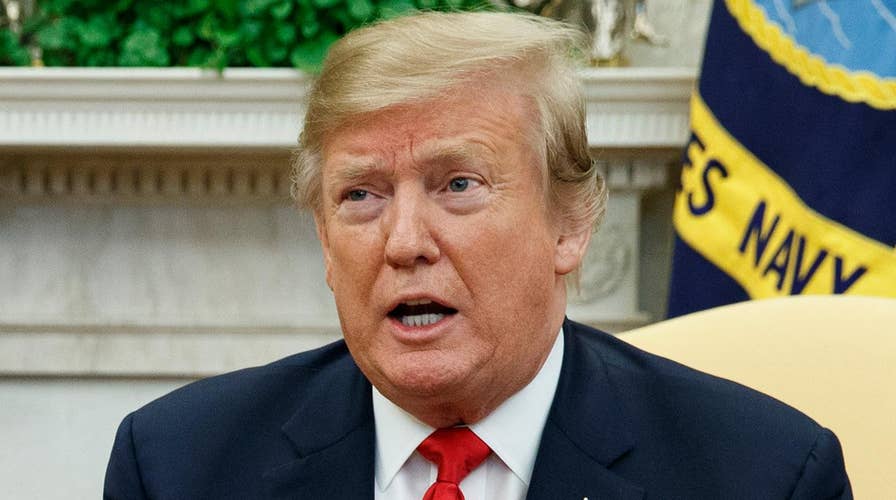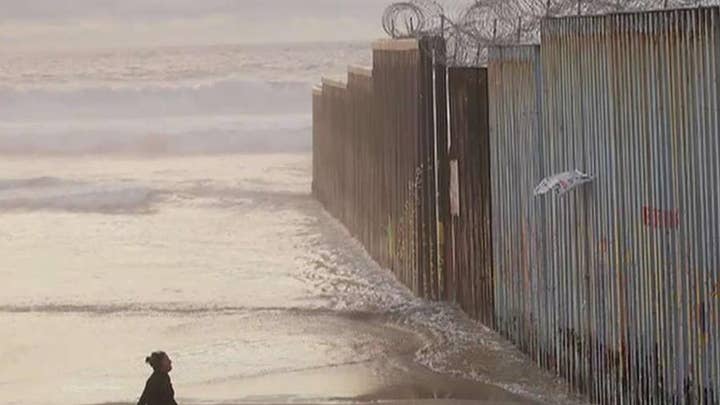President Trump unveils $4.7 trillion budget plan
Reaction and analysis from GOP strategist Lauren Claffey on 'Fox & Friends First.'
To the surprise of no one, Democrats in both chambers of Congress pronounced President Trump’s 2020 budget proposal dead-on-arrival.
Presidents propose budgets, but it’s Congress that actually writes them, and House Speaker Nancy Pelosi would rather dine on a mixed salad with razorblades than take advice from Trump. On anything.
Here is how I believe this year’s budget battle will likely work out.
Pelosi will never pass Trump’s budget. She might not even be able to pass her own budget, given the myriad and seemingly insatiable progressive demands in the House. Even if the House manages to pass a budget, it seems highly unlikely that they would be able to reconcile their budgetary differences with the Senate.
Rather than deliver a 2020 budget, therefore, Congress will likely wind up passing a series of continuing resolutions that keep the government chugging along. Perhaps, later this year they’ll wrap it all together in a bloated omnibus compromise bill.
Both parties know it will end this way. So why bother submitting a presidential budget at all?
The answer is that the budgets put together by both sides are more messaging documents than spending plans. Both President Trump and his progressive opponents use these documents to frame their differences as starkly as possible in preparation for the 2020 elections and give voters the choice of which policy priorities to pursue.
So what are the defining priorities evident in the Trump budget? On security, it is easy to spot the three big lines in the sand separating him from the progressives.
One is defense. Trump believes in peace through strength, yet he inherited a seriously weakened, underfunded military. In his first two years, he was able to reverse some of the defense spending cuts made under the Obama administration, achieving some improvements, particularly in readiness. But there is still much work to be done.
The president’s total defense request for FY2020 recognizes and responds to that need. His “ask” of $750 billion is quite reasonable, yet contrasts sharply with the left’s view of the matter. They are looking for ways to cut military spending, going so far as to consider gutting decades of bipartisan support for the U.S. nuclear deterrent.
While Trump’s messaging on the need for a strong defense is on point for FY2020, his budget itself comes up short beyond that. Spending in the out years won’t even keep up with inflation. We’ll have to do much better than that if we are to overmatch Russia and China.
The second clear line in the sand is the issue of border security. By any objective measure, there is a security and humanitarian crisis at the Southern border – one fueled by criminal cartels, politics on both sides of the border, and loopholes in the law that hamstring effective border security. The caravans are emblematic of the problem.
Trump argues that gaining operational control of the border is a top-tier challenge. To meet it, he has requested more funding ($8.6 billion) for the wall, detention facilities and other border security measures. The left flatly opposes this. Both sides have picked their ground. Americans will have to choose. They can either be for open borders or not.
Even if America sides with Trump, solving the problem at the border will require more than just a wall, and the president knows it. For example, loopholes in immigration law that encourage and enable illegal immigration must be closed. But that requires a heavy legislative lift – one that can occur only if the president has the support of the Congress.
The third line in the sand is diplomacy. Trump doesn’t think America’s conventional diplomacy, foreign assistance and international organizations are up to the big challenges of dealing with the likes of Russia and China. He is right.
In constant dollars, the State Department budget is nearly 50 percent higher than it was in the mid-‘90s. Staff has increased at an even faster clip.
President Obama lavished resources on State, even as he squeezed the Pentagon. Did any of that help stem the rise of Iran, North Korea, Russia and China as destabilizing influences? The short answer is no.
CLICK HERE TO GET THE FOX NEWS APP
Our legacy instruments of statecraft aren’t getting the job done. In calling for cuts here, Trump is sending another strong message.
Odds are that the current Congress won’t cut one penny from foreign aid. With the support of a future Congress, the Trump administration would be in a position to try once more to implement reforms that would better prepare the State Department to deal with the problems of the 21st century.











































